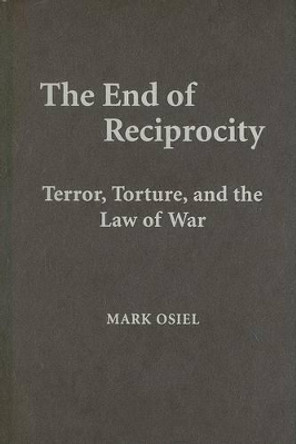Description
This book examines reciprocity between asymmetrical sides in war and conflict.
About the Author
Mark Osiel has written five books on the law of war, most recently Trying Tyrants: Making Sense of Mass Atrocity (Cambridge University Press, 2008) and Mass Atrocity, Ordinary Evil, and Hannah Arendt: Criminal Consciousness in Argentina's Dirty War (2002). He has lectured at the International Criminal Tribunal for the former Yugoslavia and advised on the prosecution of General Augusto Pinochet and the perpetrators of the Rwandan genocide. He regularly consults to international organizations and governments in post-conflict societies on issues of transitional justice. Osiel has been a Visiting Fellow at Cambridge University, Harvard's Kennedy School of Government, the London School of Economics, and universities in Argentina, Brazil, France, and India. He teaches law at the University of Iowa.
Reviews
'Many books have now been written about the law and ethics of how states should respond to terrorists who respect neither. This book may be the most impressive of them all: a hardheaded, clear-eyed, unsentimental argument for observing humanitarian restraints in the law of armed conflict even when adversaries do not. Drawing on deep reservoirs of learning in the law, history and sociology of armed conflict, Osiel challenges both critics and defenders of the Bush Administration's anti-terror policies: idealist human-rights advocates who prescribe absolute adherence to moral norms regardless of what enemies do, and 'realists' who want to calculate in each case whether adherence will yield more benefits to national self-interest than costs. Ultimately he suggests that acting upon national self-conceptions of civilized conduct rooted in honor may induce the cooperation of other nations in building the networks that constitute a social contract. Neither blinding himself to the savagery and brutality of modern conflict nor falling into a shallow cynicism, Osiel offers a penetrating analysis of current policies and the controversies over them and a grounded, carefully reasoned, basis for hope for something better.' Robert W. Gordon, Yale University
'This is a wonderfully provocative study of an important question by a highly regarded and thoughtful author. What more could you ask for? The End of Reciprocity is well researched and meticulously documented; serious and scholarly. It addresses the tough question of reciprocity head-on and fearlessly. Osiel's arguments are both persuasive and balanced. This is a valuable read for anyone who cares about how the United States wages war now and in the future.' John Hutson, Admiral (Ret.), Judge Advocate General of the Navy, 1997-2000, and Franklin Pierce Law School
'Mark Osiel has a talent for looking squarely into abysses and clarifying, for the rest of us, what is involved in such issues as torture or attempting to bring some sort of moral order to modern warfare, including wars against terrorists. His new book is profound, illuminating, and unsettling. It deserves wide readership and, just as importantly, discussion.' Sanford Levinson, University of Texas, Austin and the W. St John Garwood and W. St John Garwood, Jr Centennial Chair
Mark Osiel examines questions at the heart of today's most vexing issues in the 'war on terrorism.' With a scholar's eye and an intellect informed by broad international legal experience, he asks if reciprocity remains an appropriate guide to American battlefield conduct when dealing with an enemy who neither respects nor recognizes traditional bounds on combatant behavior ... Even those who disagree with Professor Osiel's arguments, as I deeply do, will reexamine their own legal and moral positions in light of his skilled arguments that blend law, history, ethics and realpolitik. This is a work of scholarship and intelligence that everyone concerned with the rights and duties of states and non-state actors should read.' Gary Solis, Marine Lt. Col. (Ret.), Judge Advocate General, West Point and Georgetown University Law Center
'Mark Osiel's The End of Reciprocity: Terror, Torture, and the Law of War provides detailed discussions of a number of important moral and legal issues arising for the United States in its ongoing response to the threats posed by the Al Qaeda terrorist network ... Osiel offers a distinctive and provocative view on these issues, and displays a wide knowledge of relevant literature in a number of fields, including international law, philosophy, sociology and cultural studies. As such, the book ought to be of interest to a wide audience.' Criminal Law and Philosophy
Book Information
ISBN 9780521730143
Author Mark Osiel
Format Paperback
Page Count 676
Imprint Cambridge University Press
Publisher Cambridge University Press
Weight(grams) 900g
Dimensions(mm) 230mm * 152mm * 30mm








